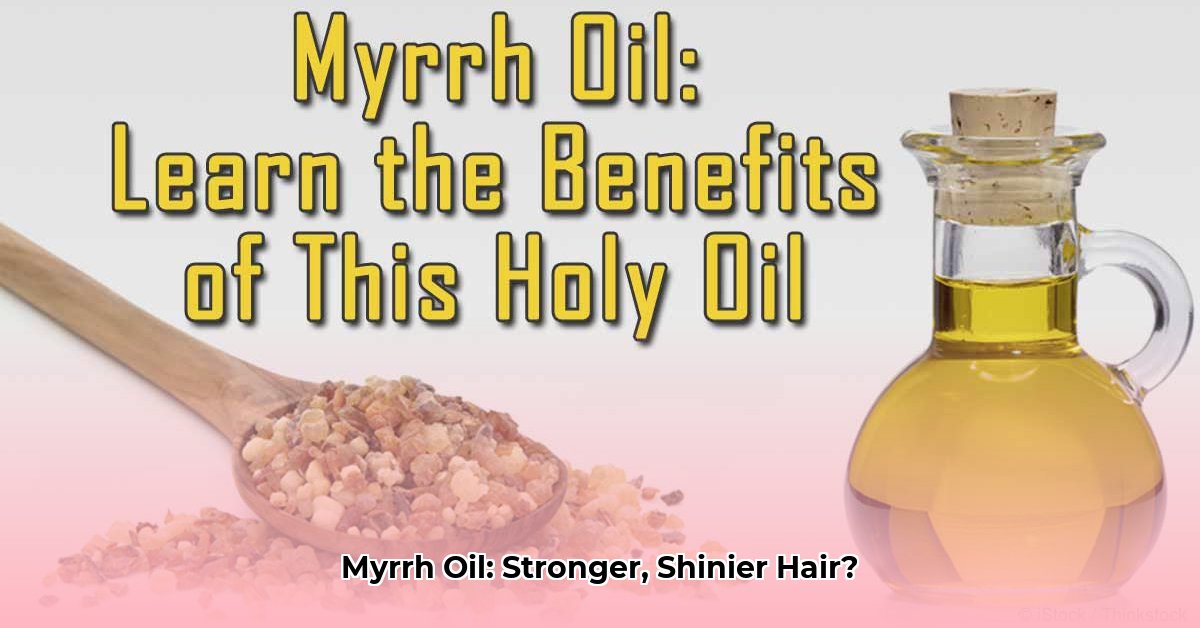
For centuries, myrrh resin has held a revered place in traditional medicine and beauty rituals. Now, modern interest is exploring its potential to enhance hair health. This article delves into the purported benefits of myrrh oil for hair, providing a balanced perspective supported by current scientific understanding and practical guidance for safe and effective use.
Benefits of Myrrh Oil for Hair
Myrrh oil, derived from the resin of the Commiphora myrrha tree, is believed to offer several potential benefits for hair and scalp health. These purported benefits stem from its inherent properties:
- Antimicrobial Properties: Myrrh oil exhibits antimicrobial activity, potentially combating scalp infections like dandruff and promoting a healthier scalp environment. However, more research is needed to confirm its efficacy in treating specific scalp conditions.
- Anti-inflammatory Effects: Its anti-inflammatory properties may soothe an irritated scalp, reducing inflammation associated with conditions such as seborrheic dermatitis. Again, further scientific investigation is warranted.
- Improved Scalp Circulation: Some believe that myrrh oil may stimulate blood flow to the scalp, potentially promoting hair growth. This remains largely anecdotal, however. (1)
It's crucial to distinguish between anecdotal evidence (personal experiences) and scientifically proven claims. While many individuals report improvements in hair and scalp health after using myrrh oil, robust, large-scale studies are necessary to definitively confirm these effects. Don't we all crave stronger, healthier hair? Could this ancient remedy hold the key?
How to Use Myrrh Oil for Hair: A Step-by-Step Guide
Myrrh essential oil is potent and should always be diluted with a carrier oil before application. Failing to do so could result in skin irritation.
Step 1: Select Your Carrier Oil: Choose a carrier oil compatible with your hair type.
- Jojoba oil: Suitable for all hair types due to its similar composition to sebum.
- Argan oil or Coconut oil: Ideal for dry, damaged, or brittle hair due to their moisturizing properties.
- Grapeseed oil or Sweet almond oil: Better suited for oily or fine hair.
Step 2: Dilute the Oil: A safe starting ratio is 2-3 drops of myrrh essential oil per tablespoon of carrier oil (approximately a 1-2% dilution).
Step 3: Perform a Patch Test: Before applying to your entire scalp, test a small amount of the diluted mixture on a hidden area of skin (e.g., behind your ear) and wait 24 hours to check for any allergic reactions or irritation.
Step 4: Apply and Massage: Gently massage the diluted oil into your scalp and hair using your fingertips. Focus on areas prone to dryness or thinning.
Step 5: Leave-in or Rinse: Leave the mixture on for at least 30 minutes or, for a more intensive treatment, overnight. Thoroughly rinse with a mild shampoo and conditioner afterward.
Step 6: Frequency: Begin with 1-2 applications per week. Adjust frequency based on your scalp's response.
Precautions and Considerations
While generally safe when used correctly, myrrh oil can cause allergic reactions or skin irritation in some individuals.
- Allergic Reactions: Always perform a patch test. Discontinue use immediately if you experience any redness, itching, or other irritation.
- Pregnancy and Breastfeeding: Consult your doctor before using myrrh oil during pregnancy or breastfeeding.
- Sensitive Skin: Start with a lower dilution and monitor for any adverse reactions.
- Quality of Oil: Use only high-quality, pure myrrh essential oil from a reputable supplier.
Scientific Evidence and Future Research
Despite its traditional use and promising properties, definitive scientific evidence supporting myrrh oil's benefits for hair is currently limited. More large-scale, controlled clinical trials are needed to fully establish its efficacy and safety for various hair conditions. Existing research is primarily anecdotal or preliminary, highlighting the need for further investigation. This research gap emphasizes the need for cautious optimism when considering myrrh oil for hair.
Conclusion: Harnessing the Potential of Myrrh Oil Responsibly
Myrrh oil holds intriguing potential benefits for hair health, backed by traditional use and promising inherent properties. However, it's essential to approach its use cautiously. Always dilute it properly with a carrier oil, perform a patch test, and closely monitor your scalp's response. While anecdotal evidence is suggestive, concrete scientific proof remains elusive. Further research is vital to fully understand its effects and ensure safe and effective use. Until then, informed caution and responsible application are paramount.
(1) While there are many anecdotal accounts supporting these claims, the current scientific literature lacks robust clinical studies demonstrating these effects conclusively. More research is needed.